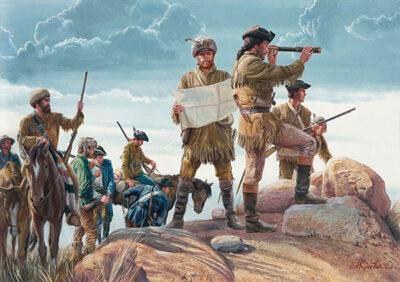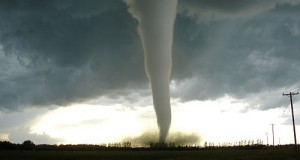It was May 20, 1803, when Meriwether Lewis and William Clark met up to embark on one of the gutsiest and daring land expeditions of all time. As part of the Corps of Discovery Expedition, the two men would carry out Thomas Jefferson’s order to explore the West, reach the Pacific and get an idea of what exactly came included with the Louisiana Purchase.
Eight thousand miles later, it was fairly apparent that these guys had taken a good old-fashioned western beating. If there were ever a test of survival skill, these guys had taken the final exam of them all.
Their tales of guts and steel-hard survival instinct were certainly not in question. It is true, however, that they experienced a few mishaps along the way. But ultimately, I believe that it was five particular survival skills that carried them back across the mighty Mississippi with one heck of a story to tell. Today, these same five skills could help us if we find ourselves in treacherous and unfamiliar lands.
No. 5 – Trade
One of the most disheartening consequences of a massive, destabilizing crisis is that the rule of law goes out the window. People will panic and likely become wildly and dangerously unpredictable.
If you’re in a situation where you’ve got to get from point A to point B and the area you have to traverse stretches through a wilderness of unknown territory, then you’ve got a problem. How do you know where to travel, where to avoid, who will be hostile or who might be helpful? You don’t. But humans also have predictable tendencies as well. For instance, even anarchic societies have been able to manage some semblance of order via trade and economics.
Story continues below the video
Lewis and Clark knew this going in, which was why they brought a whole wagon of trade goods with them. Even back then, people generally respected and understood the philosophy of, “I scratch your back, you scratch mine.” This philosophy played out quite literally in one entry of the expedition. According to an article from the University of Virginia:
“Lewis and Clark used their medical supplies and expertise to foster good relations with the Indians and to trade for desperately needed provisions. Clark treated the sore back of a chief’s wife by rubbing camphor and applying warm flannel.”
And for that, they received two new horses.
No. 4 – Foraging
Have you ever heard of the pawpaw?
This little fruit with a mango/melon taste apparently saved the Lewis and Clark expedition when supplies ran low and game was scarce. Fortunately, Meriwether Lewis was an amateur botanist who was able to easily identify this tropical fruit since it grows along the banks of the Potomac.
That’s why I suggest studying books like Peterson Field Guides and take them with you when you spend time outdoors. Just don’t do what Lewis did, because on one occasion he poisoned himself after eating some berries that he wasn’t exactly familiar.
A survival situation is certainly not a good time to test and see if a berry is edible.
No. 3 – Trapping and Hunting
Especially in survival/bushcraft situations, you’re going to burn through calories like a rocket does fuel. This means that foraging might get the job done for today, but it’s not going to cut it if you’re going to be in the wild for the next several months. You’re going to need either carbs or meat, which is precisely why hunting and trapping was of great importance to the corps.
Story continues below the video
In his diary, Clark discussed how much game it took to feed four dozen incredibly hungry men with incredibly high metabolisms. On July 13, 1805, he wrote: “We eat an emensity of meat; it requires 4 deer, or an elk and a deer, or one buffaloe to supply us plentifully 24 hours.”
Apparently, each guy scarfed down a whopping nine pounds of meat daily when game was plentiful. This is why having a strong knowledge of hunting and trapping is absolutely critical, especially over a long-term survival timeline. No, it might not be totally necessary in a shorter 72-hour survival scenario. But if you’re bugging out for a while, then you’re going to need a diet that’s sustainable.
No. 2 – Land Navigation
Lewis and Clark were highly trained navigational experts. They knew the only real way to get back to where you came from is to know where you currently are. Through their use of compasses, sextants, artificial horizons, etc., they were able to go into unknown territory completely blind – and after 8,000 miles still find their way back home. And what’s more is that they didn’t even have a map, because they were the first ones to make the maps in those regions.
Land navigational orientation is an important part of wilderness survival, especially in areas where civilization’s landmarks are scarce. Skills like the kind you find in the video below are absolutely critical.
No. 1 – Making Friends
One of the most memorable aspects about the Lewis and Clark expedition is how the region’s inhabitants treated these odd-looking strangers.
There were quite a few recorded occasions when the corps was facing some of the worst possible circumstances and it seemed imminent that men were going to start dropping dead of starvation and exposure. But unexpected help came from the various Native American populations in the region. In one situation, the Nez Perce people were initially going to attack and annihilate the corps, but instead took care of the corps – feeding them buffalo, fish and fruit.
Additionally, Sacagawea and the Shoshone people greatly assisted the corps and are credited with keeping the entire expedition from failing.
Conclusion
In the same way that skills in trade and bartering can provide us with stable relations and much needed supplies, it’s the ability to win friends that could turn a desperate situation into one where help arrives. The issue with total reliance on trade is that it doesn’t work unless both parties have adequate enough resources for a transaction to take place.
Skills in bushcraft, hunting, trapping, foraging and navigation will be absolutely indispensable in a survival situation. But it will be our people skills and the ability to work together that will ultimately win the day.
What would you add to this list? What other skills can we learn from Lewis and Clark? Share your thoughts in the section below:
Could You ‘Live Off The Land’ With Your Rifle If Necessary? Read More Here.
 Off The Grid News Better Ideas For Off The Grid Living
Off The Grid News Better Ideas For Off The Grid Living





